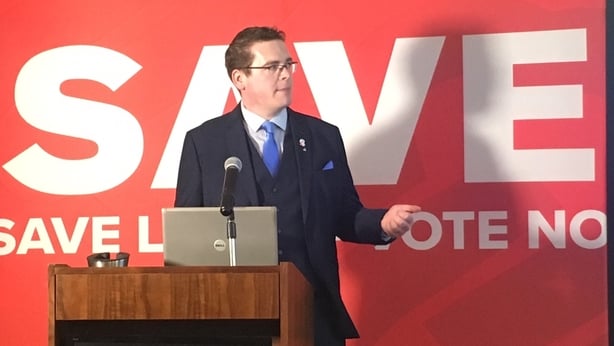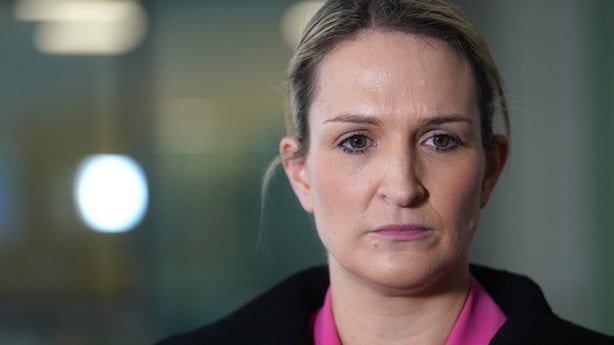In a world of misinformation, getting it right has never been so important
"An Garda Síochána... has put in place measures to ensure the safety of the individual."
It was a stark, standout line in a brief garda statement issued on Thursday morning.
It was referring to what gardaí described as a "highly inaccurate" article that had appeared the day before on the online news outlet Gript.ie.
The site had published a story about an unnamed individual that it said was a person of interest in the investigation into last month's stabbing attack in Dublin.
However, gardaí said the individual referenced in the article was not a person of interest. They contacted Gript and the story was removed.
The article did not name the person, but it did outline details of their dealings with the State's asylum system.
Some social media users then went on to post what they claimed was the person's name and photo.
It led to fears over that individual's safety and gardaí moved to put security measures in place to protect the person.
"An Garda Síochána is aware of some social media posts resulting from the article that purport to identify the individual and has put in place measures to ensure the safety of the individual," according to the garda statement.
Initially, Gript Media said it was investigating if it had been deceived by a source and warned that if this was the case its obligation to protect their anonymity would be considered forfeit.
Later on Thursday, the website's editor, John McGuirk, issued a statement apologising for the mistake.

"We are investigating all the circumstances that led to the error, but there clearly was an error, and I want to apologise to our readers, who deserve better," he said.
Mr McGuirk said their reporting was sourced from trusted individuals who have never provided them with false or misleading information before and added that it was also cross-checked with a trusted official.
"Obviously we will now have to establish and investigate their role in this, as well as our own processes, and will now do so," Mr McGuirk said.
"We did not name anybody. We did not link to any identifying documents. We did not identify others involved in the story we reported."
"We clearly stated in our report that the individual suspected of a grave crime is in a Dublin hospital, under guard," he added.
Asked about the matter on Thursday, Minister for Justice Helen McEntee said she would not comment on the specifics but added that everyone should take responsibility for any content they share or pass on.

"There has been a lot of misinformation spread since last Thursday on a lot of different matters that can be hugely disruptive to investigations but also can be hugely upsetting to maybe people," she said.
Professor Jane Suiter from DCU's School of Communications said it is important that media outlets correct mistakes when they occur.
"I think it is as important for alternative media, and those who claim to be journalists, or are members of the Press Council, to abide absolutely and rigorously by the code of conduct of the Press Council," Professor Suiter said.
"In the past, Gript Media have attacked the idea of journalism and have claimed they are the authentic voice, to my mind that does not chime with the code of practice of the Press Council," she said.
"It's clear that they need to be able to at least claim that they abided by professional standards and to apologise when it's clear that they thought they did not, so it's good that that happened but it's important those standards are adhered to at all times," she added.
While Gript Media may have insisted that its reporting was properly source, it resulted in a 'highly inaccurate' article that prompted gardaí to take steps to protect the safety of an individual.
Gript made a mistake, but it highlights that what happens in the online world can have very serious consequences in the real world. This can particularly arise where, unlike in the case of Gript, false information is intentionally spread online whether in the form of misinformation or disinformation.
That was one of the key findings from research on online misinformation and disinformation in Ireland which was released last month by the Institute for Strategic Dialogue (ISD).
The study, entitled 'Uisce Faoi Thalamh: An Investigation into the Online Mis- and Disinformation Ecosystem in Ireland', analysed more than 13 million posts from 1,640 accounts across 12 online platforms between January 2020 and April 2023.
According to the research, far-right groups and individuals play a major role within the Irish misinformation and disinformation ecosystem.
The study found that it was frequently the same people discussing varying but interconnected topics such as Covid-19, immigration, climate change and LGBTQ+ issues.
Researchers noted that these online discussions often attempted to fuel offline hostility and violence, encouraging mobilisation and protest.
In addition, the study found that alternative media outlets also play a major role within the misinformation and disinformation ecosystem.
"Alternative media outlets routinely produce conspiratorial and confrontational content towards mainstream media which is extremely popular online," the report states.
It also found that alternative media outlets play an outsized role when it comes to the sharing of topics within discussions.
One of the alternative media outlets referred to in the study is Gript Media.
"Gript has emerged as a prominent entity within the Irish mis- and disinformation ecosystem, with their posts consistently gaining some of the highest interactions within the topics analysed," the ISD study found.
Researchers studied the sharing of information under nine headings: conspiracy, ethnonationalism, 5G, Irish politics, health, immigration, climate, Russia-Ukraine and LGBTQ+.
It found that Gript was the most shared media platform for seven out of the nine topics analysed.
When offered a right of reply by the ISD research team, Gript disputed the findings and expressed its belief that ISD has not met the requirement, under its own framework, to include Gript in the project.
The outlet also requested that it be noted that Gript has written critically about ISD and its staff in the past.
Gript published a column in response to the ISD report criticising the findings and criticising RTÉ's coverage of it.
"...the State broadcaster is pushing the line, pushed by the ISD, that we need more online censorship of views they don't like, which are usually most often conservative views," wrote Laura Perrins, the author of the piece.
She accused ISD of being part of a pro-censorship and anti-free speech ecosystem and highlighted the fact the institute's funders include the Bill and Melinda Gates foundation and the Open Society Foundation, which was founded by billionaire George Soros.
Media outlets make mistakes and get stories wrong. That is a fact.
But while in the past, an incorrect article may have resulted in defamation proceedings, on-air apologies and legal bills, these days it can lead to gardaí having to protect an individual's safety.
The events of recent weeks have highlighted the power of social media when it comes to enflaming tensions and spreading inaccurate information.
In such an environment, the role of trusted news sources has never been more vital and it has become more important than ever for journalists to get it right.

